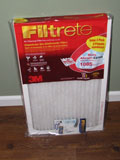 Selecting a furnace filter will mean that you have to choose the type that you want. There are different types and ratings as to quality.
Selecting a furnace filter will mean that you have to choose the type that you want. There are different types and ratings as to quality.
Furnace filters are rated by how well they trap particles in the air. The smaller and greater quantity of particles trapped, the better the filter, more or less.
There are different types of filters that you can get. They range from a disposable fiberglass filter to an electronic air cleaner. HEPA filters, the kind used in hospitals are the best at removing allergens and dust. However, the down side is that they restrict the air flow. Most residential furnaces are not equipped for the added resistance.
The question becomes, how concerned with allergens are you? You have to weigh that against cost for your furnace filter replacement project. When allergies are a problem, the extra cost is worth it.
There are some rating systems for furnace filters. The MERV rating (1 to 11, the higher the number the better)is sponsored by the American Society of Heating, Refrigerating, and Air Conditioning Engineers (ASHRAE) and is intended for comparison use.
The MPR system uses numbers up to 1250, with the higher numbers being better. Obviously, the better quality filters cost more. For a discussion on all the types of furnace filters, go to 'Types of Furnace Filters'. Find out what you need to know to make a good decision.
Types of Filters
Understanding furnace filter types is important if you have members of your family with health issues. Allergies and respiratory problems are adversely affected by poor air quality. Getting the right type of filter can improve the purity of the air in your home.
There is no question, better filters will cost more. Compared with trips to the doctor the added cost may be insignificant. Add to that the breathing discomfort that you or someone else in your home may experience, and cost pales in importance.
Do you understand the rating systems for furnace filters? See the article 'Understanding Furnace Filter Ratings' for more information. Do you need to know how to replace your furnace filter? See the article 'Furnace Filter Installation' for instructions.
Below you will find listings for some common furnace filter types. Cost needs to be weighed against a families health concerns when selecting a filter.
Disposable Fiberglass Filters
These types of furnace filters are the least expensive ones to buy. You can probably find one that fits your furnace for a couple of dollars. You can buy a package of 12 for around $20. That sounds great. Well it is if cost is your only concern.
Unfortunately, the lower cost also means lower performance. These types of furnace filters will have MERV ratings between 1 and 4. The do an adequate job of removing dust from the air. For other things like bacteria, mold, pollen and small dust particles, they do a poor job. For homes that have people with allergies, they are not suitable.
Washable Electrostatic Filters
Electrostatic types of furnace filters are generally permanent and can be washed. They work by generating a positive charge that causes the dust to stick to the media. They are more expensive than disposable filters. However, considering that they are permanent the cost savings over the long haul can be significant. This type of furnace filter can be washed out with a hose, allowed to dry an put back in the furnace. The price range for a filter of this kind is between $50 and $200.
Electrostatic furnace filters do not have MERV ratings, because they are not a dry filter media. You will have to rely on information from the manufacturer to determine the performance of the filter.
There are some pleated disposable filters that also generate an electrostatic charge. This is perhaps getting the best of both worlds. These filters boast electrostatic charges for dust particles and quality pleated filter
Pleated Allergy Filters
Pleated allergy types of furnace filters are as the name implies, pleated. The pleating allow for better air flow while still filtering out small particles. These types of filters are good at removing common allergens and fine dust from the air.
This increased performance does not come without cost. This type of filter runs between $5 and $20 each. Most of them are good for three months before they need replacing. For homes that have people with allergies, they are a must.
These types of furnace filters will usually have MERV ratings of between 7 - 9 and MPR ratings of 600 - 1500. They are suitable for residential heating systems.
Electronic Air Cleaners
Electronic air cleaners are another piece of equipment that attaches to your heating and air conditioning system. The are fairly expensive, upwards of $1,500 installed. In addition they require regular maintenance and filter replacement.
The advantages are that they eliminate a higher percentage of contaminants from the air. For those with allergies or other health problems, this peace of mind may be worth the added expense. You have to have an hvac contractor install the system for you, since it has to be integrated with your duct work. Once installed, you can maintain it a replace the filters yourself.
Activated Carbon Filters
The addition of activated carbon to a furnace filter will help with odor control. Cooking, pet or smoke odors can be removed with activated carbon. The activated carbon is added to a pleated filter media that eliminates the other types of particles. These types of furnace filters are a little more expensive than the pleated allergy filters. When odors are a problem, you may not mind the extra expense.
Activated carbon filters can have a MERV rating, similar to other style filters. A rating of 8 should be possible. This is a good rating for a residential heating system.
HEPA Filters
HEPA stands for 'High Efficiency Particulate Air'. These are the best filters you can get for removing small contaminants. The problem is that they seriously restrict the flow of air in your ventilating system. Commercial buildings such as hospitals use this type of filter. They design the hvac systems for the reduced air flow.
There are some pleated allergy filters that claim to be HEPA rated. They may carry a MERV rating of 12. A filter like this will likely be suitable for a residential furnace. When in doubt, check with the manufacturer of your furnace or your furnace maintenance contractor.

